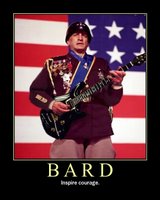Sunday, March 19, 2006
V for Vendetta
Remember, remember the fifth of November; gunpowder, treason and plot; I know of no reason why the gunpowder treason should ever be forgot.
Just saw the movie, never read the graphic novel, though I am a big Alan Moore fan. Moore's name, incidentally, appears nowhere in the film. Characteristically, he has repudiated it.
Visually, I thought the film was very appealing. London in 2020 has the dreary, impersonal look of an Eastern Bloc state before the fall of communism. There were some homages to other films, like John Hurt (as the High Chancellor) always appearing on a gigantic Big Brother style video screen, and large ubiquitous PA systems located everywhere for broadcasting propaganda. Moore's original 1980's screed against Thatcherite Britain has been updated by the Wachowski Brothers to include references to Iraq, "America's War" and anti-Muslim bigotry (even owning a copy of the Koran is a capital offense). The limited nuclear war of the graphic novel has been replaced by bio-terrorism. It's enough of an update that conservatives see it as an attack on Our Dear Leader.
Oddly, there is no apparent racism in this fascist state (a major theme in the graphic novel), even though the governing party has the Aryan-sounding name Norsefire, but homosexuals are still rounded up and sent off to concentration camps. Maybe anti-homophobia is more popular in Hollywood than anti-racism these days. There's also some interesting philosophy as well: are there really no such things as coincidences? Is one man's terrorist another man's freedom fighter? Is order without freedom (tyranny) really the only alternative to freedom without responsibility (licentiousness)?
There are problems, of course; in some parts of the film, it's hard to tell if we are watching reality or some fantastic vision. Two characters who die earlier in the film (one of them on-screen) inexplicably return at the end. Also, I'm not sure I can buy the idea of the notoriously agnostic Brits being taken in by a dictatorship of the Religious Right. Overall, though, I thought it was an excellent film, weighed on its own merits.
Just saw the movie, never read the graphic novel, though I am a big Alan Moore fan. Moore's name, incidentally, appears nowhere in the film. Characteristically, he has repudiated it.
Visually, I thought the film was very appealing. London in 2020 has the dreary, impersonal look of an Eastern Bloc state before the fall of communism. There were some homages to other films, like John Hurt (as the High Chancellor) always appearing on a gigantic Big Brother style video screen, and large ubiquitous PA systems located everywhere for broadcasting propaganda. Moore's original 1980's screed against Thatcherite Britain has been updated by the Wachowski Brothers to include references to Iraq, "America's War" and anti-Muslim bigotry (even owning a copy of the Koran is a capital offense). The limited nuclear war of the graphic novel has been replaced by bio-terrorism. It's enough of an update that conservatives see it as an attack on Our Dear Leader.
Oddly, there is no apparent racism in this fascist state (a major theme in the graphic novel), even though the governing party has the Aryan-sounding name Norsefire, but homosexuals are still rounded up and sent off to concentration camps. Maybe anti-homophobia is more popular in Hollywood than anti-racism these days. There's also some interesting philosophy as well: are there really no such things as coincidences? Is one man's terrorist another man's freedom fighter? Is order without freedom (tyranny) really the only alternative to freedom without responsibility (licentiousness)?
There are problems, of course; in some parts of the film, it's hard to tell if we are watching reality or some fantastic vision. Two characters who die earlier in the film (one of them on-screen) inexplicably return at the end. Also, I'm not sure I can buy the idea of the notoriously agnostic Brits being taken in by a dictatorship of the Religious Right. Overall, though, I thought it was an excellent film, weighed on its own merits.
